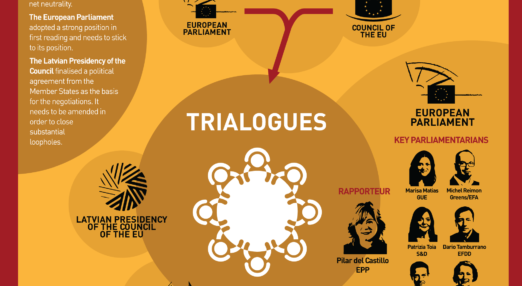Our work
EDRi is the biggest European network defending rights and freedoms online. We work to to challenge private and state actors who abuse their power to control or manipulate the public. We do so by advocating for robust and enforced laws, informing and mobilising people, promoting a healthy and accountable technology market, and building a movement of organisations and individuals committed to digital rights and freedoms in a connected world.
Filter resources
-

Net Neutrality: Save The Internet relaunch
On 23 March 2015, the “trialogue” discussions between the Council of the European Union, the European Commission and the European Parliament on the “Telecommunications Single Market Regulation”, began. The negotiations cover proposals on net neutrality. To ensure that citizens’ concerns about the future of the open Internet are heard by the decision-makers involved in the […]
Read more
-

Legal Affairs Committee: ISDS and IPR must be excluded from TTIP
The Transatlantic Trade and Investment Partnership (TTIP) resolution in the European Parliament is coming to a conclusion. 16 April 2015 was the deadline for European Parliament committees to submit their opinions to the leading committee, the International Trade committee (INTA). EDRi-gram previously reported about the positive vote of the Civil Liberties Justice and Home Affairs […]
Read more
-

French surveillance bill pushed ahead despite massive criticism
On 19 March 2015, France proposed a new bill that would allow intelligence services to collect vast amounts of data, to tap phones and emails without permission from judges. The scope of application of the draft bill is extremely broad and covers the following ill-defined areas: National independence, territorial integrity and national defence Foreign policy […]
Read more
-

New Danish PNR system will rival the EU PNR Directive
For the second time in the parliamentary year 2014-15, the Danish government has made a legislative proposal for increased access to Passenger Name Records (PNR). The draft law, currently in public consultation, also sheds new light on the use of PNR data by Danish customs authorities. So far, the PNR discussion in Europe has mainly […]
Read more
-

Non-US Twitter accounts now subject to EU Data Protection rules
On 17 April 2015, Twitter revised its privacy policy, explaining that it will change the location of processing of the account information of users outside the United States. On its website Twitter announced that the services for non-US users are now provided by its subsidiary based in Dublin, Ireland. Therefore, these accounts will no more […]
Read more
-

Italy: Anti-terrorism decree to strengthen government surveillance
On 15 April 2015, the Italian Senate adopted a Government decree concerning, among other issues, “urgent measures to combat terrorism” (DDL 2893/R), as amended by the Parliament on its first reading on 31 March. Before the vote in the Parliament, the government decided to exclude from the voting list the most controversial amendment on preventive […]
Read more
-

Citizens’ groups from around the world call on EC to defend privacy
The institutions of the European Union are completing a reform of Europe’s Data Protection framework. Recognising the huge significance of the reform, the European Commission made an unequivocal promise when it launched the process. As an “absolute red line”, the level of protection of individuals’ data would not fall below existing levels. However, leaks show […]
Read more
-

Net Neutrality: document pool II
On 4 March 2015, the Presidency of the Council of the European Union received the mandate from the Member States to start negotiations with the EU Parliament and the Commission on the “Telecommunications Single Market Regulation”, which includes provisions on net neutrality. The trialogue discussions between the three institutions officially started on 23 March 2015. […]
Read more
-

NOW OR NEVER: European citizens stand up to save the internet
Today, European civil society groups have relaunched “Save the Internet”, a European wide campaign aimed at defending net neutrality in Europe. The campaign calls on concerned internet users in Europe to contact their representatives in the European Parliament to ask them to maintain their strong position on net neutrality. Internet users will lose the freedom […]
Read more
-

Marrakesh Treaty: EU must take action now
In April 2015, the European Union “celebrates” one year since the signature of the Marrakesh Treaty. This Treaty seeks to facilitate access to cultural content to for people who are blind, visually impaired or print disabled. This Treaty makes mandatory for contracting parties to provide exceptions or limitations in their national legislation to the right […]
Read more
-

Social media platforms blocked again in Turkey
Turkish authorities ordered access to 166 websites, including Twitter, Facebook and YouTube, to be blocked after photos of a hostage crisis that ended with the death of a government prosecutor were circulated in the social media platforms. On 31 March 2015, in Istanbul’s courthouse, two militants took Mehmet Selim Kiraz hostage. He was the prosecutor […]
Read more
-

Report says Facebook tracking breaches EU law
On 31 March 2015, researchers of the University of Leuven and Vrije Univeristeit Brussel, Belgium, issued a report claiming that Facebook tracks online activity both of its users and non-users. According to the report, which was commissioned by the Belgian Privacy Commission, this type of tracking contravenes EU online privacy laws. Facebook uses a tracking […]
Read more
